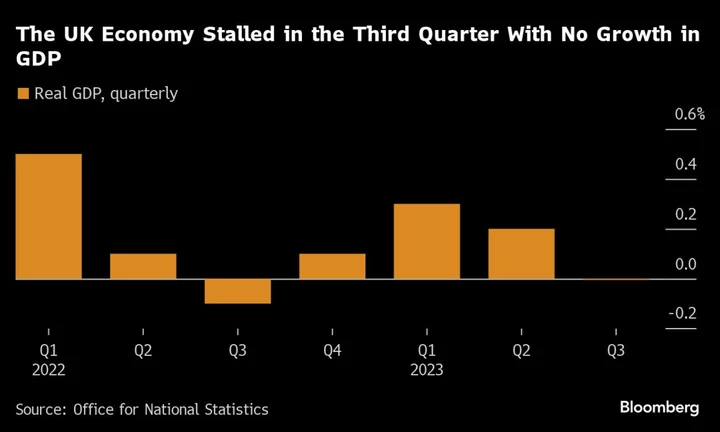The UK economy flatlined in the third quarter, defying forecasts of a small contraction and ensuring a recession is avoided this year, as strong trade came to the rescue of poor domestic activity.
Gross domestic product was unchanged from the second quarter, the Office for National Statistics said Friday. Economists surveyed by Bloomberg had forecast a 0.1% decline on average. In September alone, GDP rose 0.2%.
A quarter of stagnation had been predicted by the Bank of England, which expects the economy to register no growth at all next year. Consumer spending, business investment and government spending all fell in the third quarter, leaving the economy underpinned by a better trade performance as exports rose and imports declined.
That’s a bleak prospect for Prime Minister Rishi Sunak as he gears up for an election expected next year. Polls put the ruling Conservatives on track to lose power to the opposition Labour Party. The figures come less than two weeks before Chancellor Jeremy Hunt delivers his autumn economic statement to Parliament, which is expected to unveil measures to boost economic growth.
“Britain is a stagnation nation that has struggled to secure sustained economic growth since the financial crisis,” said James Smith, research director of the Resolution Foundation. “Addressing this is the central task we face as a country, and must be at the heart of the Chancellor’s Autumn Statement in 10 days’ time.”
The contraction in the domestic economy may also help to convince BOE policymakers they have done enough to bring inflation under control after raising interest rates from 0.1% to 5.25% in less than two years. Resolution said that the growth slowdown is being caused in part by high rates.
Chief Economist Huw Pill signaled as much in an address on Thursday after the central bank downgraded its growth outlook last week. However, both he and Governor Andrew Bailey have stressed the need to keep borrowing costs in “restrictive” territory for an extended period to bear down on underlying price pressures.
Traders are betting that rates have peaked with the BOE expected to begin cutting rates from August next year.
“High inflation is the single greatest barrier to economic growth. The best way to sustainably grow our economy right now is stick to our plan and knock inflation on its head,” Hunt said in a statement. “The Autumn Statement will focus on how we get the economy growing healthily again by unlocking investment, getting people back into work and reforming our public services so we can deliver the growth our country needs.”
The economy faced headwinds on several fronts in the third quarter. Public-sector strikes hit schools and the health service while retailers suffered from wet weather in July and unseasonably warm temperatures in September that led consumers to put off buying autumn and winter clothes. Hanging over everything was the squeeze of higher borrowing costs.
Over the quarter, construction and manufacturing both rose 0.1%, helping to offset a 0.1% contraction in services. Within the services sector, transport and real estate posted the largest declines, with the latter reflecting the downturn in the housing market. Consumer-facing services overall fell 0.7% as households cut back.
On the month, services rose 0.2%, though consumer-facing services declined for a second month. The construction sector grew 0.4%, while industrial production showed no growth.
The central bank has also predicted growth of 0.1% in the fourth quarter and flatlining through 2024. However, some economists think that’s optimistic given that around half the monetary tightening since 2021 has yet to be felt. There is also a risk that the third quarter could be revised to show a contraction.
Figures next week are expected to give the BOE further reason to pause, with inflation forecast to drop below 5% from 6.7% in September while wage growth holds close to 8% — well above level compatible with the 2% inflation target.
--With assistance from Irina Anghel and Eamon Akil Farhat.

